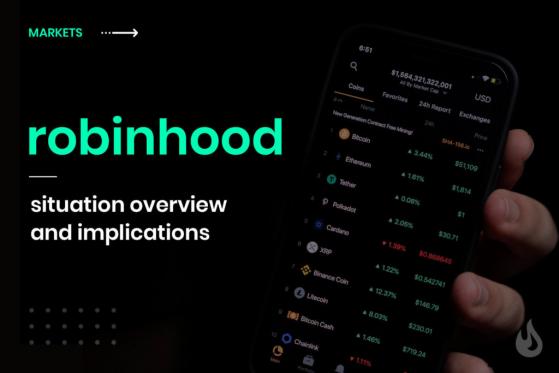- Robinhood, a trading app designed to make trading stocks easier for retail investors, is at the center of a stock market saga.
- Robinhood received wide criticisms from users and analysts after the company announced restricting trading on some stocks.
- Some users have filed a class-action lawsuit because the company was manipulating the market by restricting trade.
- Robinhood announced that it had stopped people from buying certain stocks due to the sheer volatility of the stock prices.
Robinhood is at the center of a brewing stock market saga involving several stocks like GameStop (NYSE:GME) and AMC. With over 3 million downloads on the Playstore and Apple (NASDAQ:AAPL) Store, the trading app announced that it had restricted trading on some apps citing stock prices’ sheer volatility.
Robinhood has democratized trading in stocks and cryptocurrencies amongst millennials, and the recent crises rocking the firm may see asset holders transfer their cryptos to other platforms.
The announcement sparked wide criticism from users, regulatory agencies and has even prompted an investigation by Congress. This saga’s implications might have far-reaching consequences on the financial industry and Robinhood, with a slew of class-action lawsuits filed against the company.
Robinhood And GameStop Saga 1
It all began on Reddit, particularly on WallStreetBets, a popular forum where retail investors converged to invest in GameStop stocks. The massive purchase of GameStop stocks by amateur investors caused the struggling video game retailer to see an over 14,300% increase in its stock value.
This was seemingly in opposition to hedge funds taking huge short positions in GameStop’s stock. For example, Melvin Capital announced that it had suffered a loss of 53% of its value due to the short squeeze.
On January 26th, Bloomberg noted that hedge fund and institutional investors shorting GameStop stocks had lost $6 billion to the squeeze. By the end of January, the figure had reached $12.5 billion, according to Ortex data.
Asides from GameStop, movie theater chain, AMC, and phone manufacturer, BlackBerry (NYSE:BB) saw their stock prices spike in a move buoyed by retail investors scrambling to purchase their stock.
Many retail investors utilized the Robinhood app to get in on the frenzy purchasing with over 3 million users of the platform. Things quickly turned around when the company announced that it was restricting the trading of certain stocks on its platform, including GameStop.
The company’s move was met with strong criticisms from every angle as investors using the platform were unable to trade lost money. They alleged that Robinhood was manipulating the market with this move.
However, Robinhood explained that the reason for the restrictions is due to the volatility of prices, causing the company to take out credit from banks and other financial institutions to place the trade.
On the Flipside
- After announcing its restrictions on trading GameStop’s stock, Robinhood got over 400,000 new app downloads that day.
- Dogecoin benefited from the move, climbing over 800% within 24 hours.
- Vistra Corp, VST (NYSE) has lost 24.21% of its value to trade at $17.25
Implications of The Wall Street vs. GameStop Saga
For Robinhood, the decision to restrict trading has seen users file a class-action lawsuit against the company that could see the firm pay out millions of dollars in settlements by the matter’s conclusion.
Furthermore, Congress has launched a full-scale investigation into the brouhaha with a House Committee hearing of over 50 members holding a hearing.
David Scott, a Democrat, noted during questioning that “something very wrong happened here” and blamed GameStop CEO Vlad Tenev for the issue. Robinhood faces stern sanctions from the House Committee if found culpable.
The SEC has also launched an investigation into the GameStop saga, while Senator Elizabeth Warren has called on the SEC to make sweeping legislation to regulate against manipulation. She said, “We need an SEC that has clear rules about market manipulation and then has the backbone to get in and enforce those rules.”
For cryptocurrency traders on the platform, panic ensues as uncertainty lingers whether or not Robinhood may also restrict trading on certain cryptos. It leaves.
Traders seeking to play it safe by moving their assets have met a stumbling block that makes it impossible to transfer crypto-currencies. The only way is to sell the coins and purchase them again on another platform, which inevitably leads to fee deductions.
